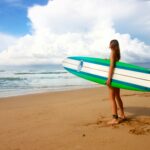In the world of surfing, the thrill of catching the perfect wave and feeling the rush of the ocean beneath your feet is unparalleled. It’s a sport that draws in enthusiasts from all walks of life, offering a unique blend of adrenaline, athleticism, and connection with nature. However, amidst the excitement and adventure, it’s crucial to prioritize safety above all else. In this blog post, we’ll delve into the importance of safety in surfing, discussing essential tips and practices to ensure a fulfilling and secure experience in the water.
Understanding the Risks:
Surfing, like any water sport, comes with inherent risks. From powerful waves and rip currents to submerged obstacles and marine life, the ocean presents a dynamic and sometimes unpredictable environment. Understanding these risks is the first step towards ensuring safety while surfing. Respect for the power of the ocean is paramount, and surfers should always approach the water with caution and mindfulness.
Essential Safety Tips:
- Know Your Limits: One of the golden rules of surfing is to know your skill level and surf within your abilities. Attempting to tackle waves beyond your proficiency level can lead to accidents and injuries. Start with smaller waves and gradually progress as you gain experience and confidence.
- Use Proper Equipment: Invest in high-quality surfing equipment, including a well-fitted wetsuit, leash, and surfboard appropriate for your skill level and the conditions. Regularly inspect your gear for any signs of wear and tear, and replace or repair as needed to ensure optimal performance and safety.
- Learn Ocean Awareness: Develop a thorough understanding of ocean conditions, including wave patterns, tides, and currents. Before entering the water, take time to observe the surf conditions and assess potential hazards. Familiarize yourself with local surf forecasts and heed any warnings or advisories issued by lifeguards or surf professionals.
- Practice Proper Paddling Techniques: Efficient paddling is essential for navigating through waves and positioning yourself for optimal surfing opportunities. Focus on maintaining a strong and steady paddle stroke while conserving energy to prolong your time in the water.
- Respect Wildlife: In many surfing destinations, encounters with marine life are a common occurrence. While most interactions are harmless, it’s crucial to respect the natural habitat of marine animals and avoid disturbing or provoking them. Be mindful of your surroundings and follow guidelines for sharing the water with wildlife.
- Stay Hydrated and Sun Protected: Spending extended periods in the sun and saltwater can lead to dehydration and sunburn. Stay hydrated by drinking plenty of water before, during, and after your surfing sessions. Additionally, apply waterproof sunscreen to protect your skin from harmful UV rays.
Conclusion:
Surfing is more than just a sport; it’s a lifestyle that fosters a deep connection with the ocean and the natural world. By prioritizing safety and adopting responsible surfing practices, enthusiasts can enjoy the exhilaration of riding the waves while minimizing the risks associated with this dynamic and rewarding activity.
Whether you’re a seasoned pro or a novice surfer, remember to always respect the power of the ocean, stay vigilant, and prioritize safety above all else. With the right preparation and mindset, every surfing adventure can be a safe and memorable experience.










